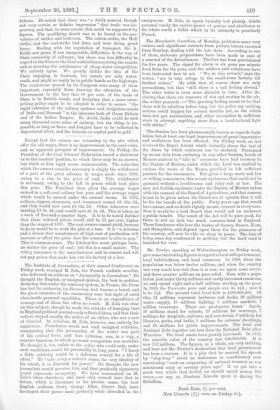The Institute of Journalists, at their annual Conference on Friday
week, receivpd M. Zola, the French realistic novelist, who delivered an address on "Anonymity in Journalism." He thought the English, or unsigned system, the best in politics, declaring that under the contrary system, in France, the Press has lost its authority, its discussion had become a brawl, and the great interests of the community were lost sight of amid abominable personal squabbles. There is an expenditure of courage and of ideas, but often no result. M. Zola was clear on this subject, though he made the mistake of fancying that in England political journals only reflected ideas, and that their writers obeyed exactly the orders of an editor, who was a sort of General. In criticism, M. Zola, however, was entirely for signatures. Frenchmen would not read unsigned criticism, maintaining that the personality of the writer was part of his critical force, and that criticism was, in a way, a creative function, to which personal recognition was essential. He thought it, too, unfair to the critic, who could only, under such conditions, assert his personality in long years. "I fancy a little celebrity would be a delicious reward for a life of effort." To "take away a writer's name, the very identity of his talent, is to diminish his power." He thought the new journalists would perceive this, and that gradually signatures would supersede anonymity. We have commented on M. Zola's ideas elsewhere, and need only remark here that in fiction, which is literature in his precise sense, the best English authors, Scott, George Eliot, Currer Bell, have developed their power most perfectly while shrouded in the anonymous. M. Zola, to speak brutally but plainly, thinks personal vanity the motive-power of genius, and attributes to the whole world a foible which in its intensity is peculiarly French.


































 Previous page
Previous page